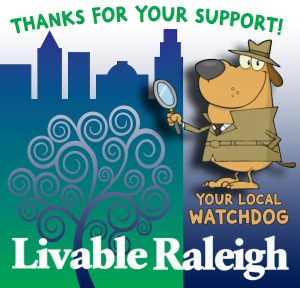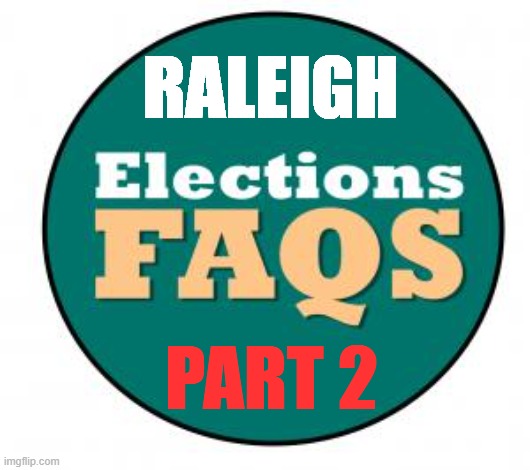We are running a 3-Part series on Raleigh’s Municipal Elections.
Today, in Part-2, we discuss Plurality, Majority, Runoffs, Ranked Choice, and Primaries (partisan and non-partisan)
Plurality, Majority, Runoffs, Ranked Choice, and Primaries (partisan and non-partisan)
So what can we do to make sure Raleigh’s elections are as democratic as possible and result in a winner who earns a majority of the votes and not just a plurality.
We’ve already mentioned that runoffs after a November election are not possible because of calendar issues according to the Wake County Board of Elections. (See Part-1, Raleigh Elections – When are they? )
Many people are interested in exploring Ranked Choice voting, where voters rank their preferences among multiple candidates running for the same seat. There are advantages and disadvantages to this approach, but the NC General Assembly has made it clear that they are not going to allow Ranked Choice voting, so that’s also not going to happen.
At this point, the only possible way to ensure majority rule is to hold a non-partisan primary in the Spring, at the same time as primaries are held for other November elections. This is what Livable Raleigh recommends.
Why a non-partisan primary as opposed to a partisan primary?
If we hold partisan primaries and candidates are running from more than two parties, we could still end up with multiple candidates in the general election, which would mean the winner in the general election might not get 50% of the vote.
With a non-partisan primary, the two top vote-getters will go up against each other in the November general election and we would be ensured of a majority winner.
Livable Raleigh recommends a non-partisan primary.
What about cost?
When Raleigh held its municipal elections at the same time as other municipalities, in October with a possibility for November runoffs, they shared some costs with other municipalities.
Holding a Spring primary followed by a November election means Raleigh shares costs with the other big-ticket races that are on the same schedule, and does save some money.
What can you do?
City Council discusses all these topics regularly, so if you subscribe to Livable Raleigh’s weekly email you will be in the know about changes they are considering.
If there is polling or a referendum on these topics, please take the time to express your opinion.
Consider contacting your City Council members to let them know how you feel.
But most of all – take the time to be an informed voter!
Livable Raleigh Editorial Team
Stay tuned for Part-3 where we’ll discuss – Term lengths and the size of Council
Missed Part-1? Read it here – Raleigh Elections – When are they?
Missed Part-3? Read it here – Raleigh Elections – What’s the right size for Council?
If you appreciate the kind of reporting we bring to you
|
Please donate $10 or $20, Thanks for supporting |
 |

